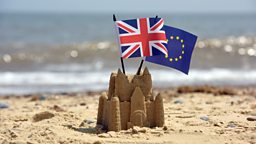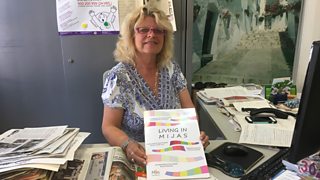The top seven ways leaving the EU could affect you
On Thursday, 23 June 2016 the UK voted to leave the EU. As negotiations get underway, BBC Radio 4's consumer programme You and Yours sorts the rumours from the reality on the topics that are going to affect you. How has the price of food changed? Which businesses are managing to thrive despite the uncertainty? And are expats living in Spain really panicking? Reporter Jess Quayle investigates.

1. Fruit and veg: Will your strawberries cost more?
Immediately after the EU referendum the value of the pound dropped, so the price of fresh produce coming into Britain from elsewhere in Europe went up. In November 2016 traders at New Smithfield Market in Manchester told the You and Yours programme they were seeing price rises up to 40%. Matthew Tunnaley who's a greengrocer in Manchester said the price for a 500g punnet of strawberries went up to £5, although that was out of season. Those prices have now come back down to normal - a punnet now costs around £1 at the market. Traders say there was a knee jerk reaction, which has now calmed down, and prices across the year haven't changed a lot.

2. Supermarkets: What about the price of Marmite?
There have been a lot of reports about prices going up. Do you remember the story about the cost Marmite - and the disagreement between its makers, Unilever and Tesco? The price of a 225g jar of Marmite at Tesco has recently gone up by 5p, a 2% rise. But that's not as high as some predictions have been. The reason being because supermarkets have a lot of buying power and they've been negotiating fiercely to keep prices down. It's likely you'll have noticed some increases, but perhaps not at the levels predicted yet. Some brands have also been selling smaller versions of their products, to avoid putting prices up.
3. Travel: Money and insurance - what you need to know
You won't get as many euros for your pounds now, as you would have done twelve months ago. But more than that, there's also uncertainty about what leaving the EU will mean for your travel insurance. At the moment if you visit a European country like Spain you can get a free European Health Insurance Card (EHIC) before leaving the UK. The EHIC isn't a substitute for medical and travel insurance, but it covers you for any necessary treatment you receive at a public healthcare centre or hospital during your trip. Once we leave the EU it’s unclear if this agreement will be the same. If it's not, you'll likely need more comprehensive medical insurance.

4. Expats: How easy will it be to go and live abroad more permanently?
Spain hosts the largest group of UK citizens living in the rest of the EU - around 300,000. At the moment they can move freely without needing a special visa, and older people can access their pensions and take advantage of free health care. In contrast, there are around 100,000 Spaniards living in the UK. How this will work in the future is one of the issues which is being looked at first in the Brexit negotiations.

Roy Perez, the Councillor responsible for foreigners in Mijas in Southern Spain, says their economy depends on tourism.
5. Citizenship: Will Brits abroad want to change their passports?
One option British people living in Spain have is to try and become a Spanish citizen. To do that, you have to know the language and complete a series of tests. Authorities in some parts of Spain have started to give out leaflets explaining what expats would need to do. It's a big decision though, and many British people living abroad see it as a last resort.

Jess Quayle talks to Anette Skou about the Spanish citizenship test, and then hears from expats about whether they'd consider taking the test.
6. Flowers: Will you be buying more British products?
The vast majority of flowers for sale in supermarkets and florists across the UK come in from abroad - Holland mainly. According to the National Farmers Union around 12% of flowers sold here are home grown. Some British growers hope to increase that number. The fall in the value of the pound means flowers coming into the UK from elsewhere around the world have been costing more, so florists in this country have begun looking for cheaper alternatives. British flowers tend to be more expensive, but Gill Hodgson who runs Flowers From the Farm - says while they look for cheaper options florists are realising home-grown flowers can be better quality. She's even got the support of some celebrities - TV presenter's Alan Titchmarsh and Mary Berry.

It's thought that 90% of flowers sold in UK florists and supermarkets are imported.
7. Exports: Could we see more British products on sale abroad?
Food and drink exported from the UK has soared to a record high in the year since the EU referendum vote. That's according to the Food and Drink Federation who say our appetite for whisky, salmon and chocolate have helped exports rise by almost 9% to £4.9 billion between January and March 2017. This boom in exports has been driven by the devaluation of currency. It's making exporting more attractive to businesses. What happens next depends on what type of trade agreement Britain gets with the EU.

-
![]()
You and Yours
News and discussion of consumer affairs
-
![]()
Seven things you didn't know about organic food
From dancing cows to the debate about health benefits.
-
![]()
The rise in child-friendly festivals now on offer
Would you take your children or grandchildren to a festival like Glastonbury?
-
![]()
Could your thermostat save you money?
It’s a piece of technology that has barely been updated for decades.




